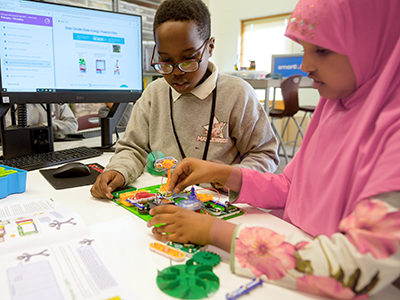How Project-Based Learning and STEM Drive Student Success
Watch the RecordingListen to the Podcast
As the demand for STEM skills grows, so too does the question of if and why we need it in the classroom. During the edLeader Panel “Implementing Successful PBL + STEM Initiatives,” Jorge Valenzuela, education leadership coach, author, and Lifelong Learning Defined podcast host, talked with Superintendent of Bridgeport-Spaulding Community School District (MI) Mark Whelton and STEM Facilitator at The Oakwood School (NC) Christopher Young about how to bring project-based learning+ and STEM to schools.
Valenzuela explained that project-based learning+ (PBL+) got its name from how it encourages students to focus on life skills, in addition to academics and STEM. He defined it as “a research-based instructional approach teachers can use to engage learners over an extended period to solve compelling real-world problems and acquire the skills and dispositions needed for successful lives.” He emphasized that the goal is not for students to complete the project, but for them to really learn and grow along the way.
Students are introduced to the project from the start, provided mini-lessons instead of lectures, and given plenty of time for hands-on work, while teachers provide feedback and more time for students to adjust their work accordingly. Valenzuela also emphasized how much students need passion and purpose, which was a major point of the rest of the panel.
Whelton stated the importance of PBL, how it empowers students and gives students and staff the academic support they need, and how STEM helps students become ready for higher education and careers and develop 21st century skills.
Students are happier and do better in school when they’re doing things they’re interested in, and STEM gets the students engaged in the classroom. In his district, there has been an increase in classroom student engagement and the students have begun taking more pride in their schools. They’re driven, happier, and succeeding on standardized tests.
Whelton has worked to bring the real world into the classrooms, giving students experiences that will help them outside of school. Students have been given chances to work with local companies to build ties with those companies and the community at large. This has helped them develop skills and abilities for the 21st century, such as how to use AI, while also fostering relationships that could lead to future job opportunities.
SmartLab, which develops customized project-based and STEM-focused learning environments, was one thing that helped him accomplish this in his district, converting dry and lifeless rooms to rooms students wanted to be in and learn in. Enrollment went up and students became more engaged to the point of not even noticing what was going on around them. These changes were blatant at all grade levels.
Young also mentioned how SmartLab supported his teaching, providing everything the school needed for STEM, as well as the training he needed to use it. Like Whelton, Young stressed the importance for students to develop 21st century skills with hands-on approaches.
The student-led work engaged the kids and made them care about what they were doing. Students generated their own work, such as repairs to the school, AI-generated materials, and the production of soaps that the school sold for charity. The school was also able to make connections with local businesses, the community at large, and colleges, such as East Carolina University and Pitt Community College.
The panelists ended by emphasizing how project-based learning and STEM help students learn and grow on their own and become invested in school. Valenzuela concluded that when students focus on the process, learning happens and students succeed.
Learn more about this edWeb broadcast, Implementing Successful PBL + STEM Initiatives, sponsored by SmartLab®.
Watch the RecordingListen to the Podcast
Join the Community
STEM Learning: Full STEAM Ahead is a free professional learning community that provides educators, curriculum leaders, and industry members with a place to collaborate on bringing more science, technology, engineering, and mathematics into the classroom.
SmartLab® develops customized, project-based and STEM-focused learning environments that include hands-on projects and equipment; authentic, student-led experiences; standards-aligned supplemental curriculum; and rigorous training and professional development. SmartLab®’s mission is to prepare students for the careers of tomorrow. Learning is different here!
Article by Jon Scanlon, based on this edLeader Panel






Comments are closed.